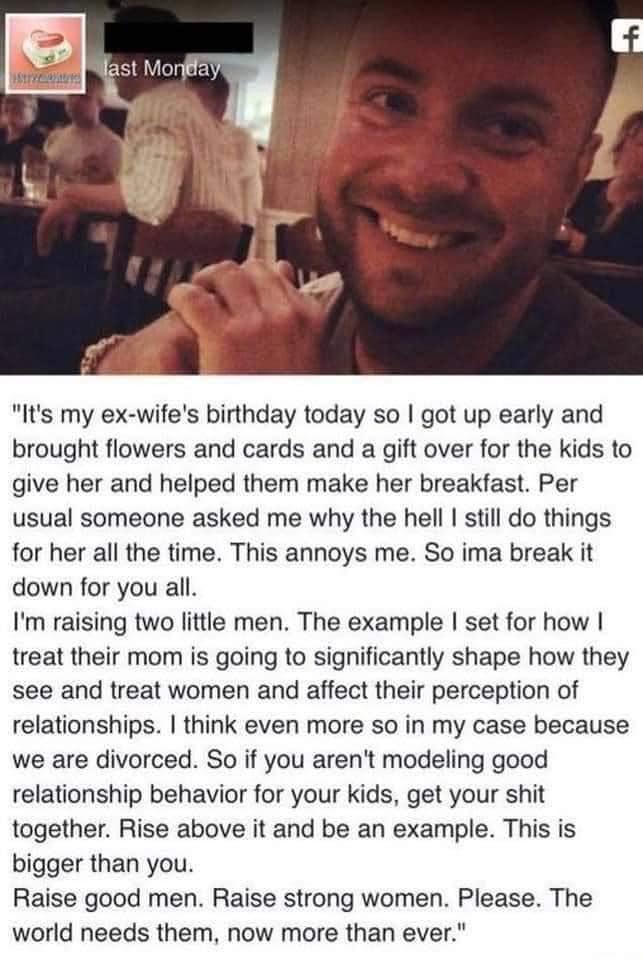“Ending a relationship is not a failure; it’s a step towards personal growth.” —Anonymous
When a relationship breaks down and the issues are not resolvable, one of the most difficult parts is finding a way to end things that does not hurt the people involved any more than necessary. Often, there is so much built-up anger & resentment that it seems impossible to separate amicably. But it truly is possible.
Saying goodbye to a shared history, home, family and friends is challenging, especially when children are involved. But it does not have to end badly or bitterly. Your kids can end up being happy in two homes, and so can both of you.
I am writing this post for the many people who are going through a separation, divorce or break up, or are considering one, to provide hope and inspiration. We need to learn as a society how to take the animosity out of break-ups, so there is less emotional damage for everyone involved.
I also write it to be a voice for children who are watching their world as they know it change, unable or too afraid to tell their parents what they are feeling and what they need most from them. (What they need most is for their parents to be as calm and steady for them as possible, and not put them in the middle.)
While I know there are circumstances where an amicable split is not possible (like when there is abusive behaviour), there are many cases where it is. And where it is possible, in the long run it’s far better for everyone involved.
So let’s look at how to “consciously uncouple” and end a relationship peacefully and respectfully…
What a “good” divorce looks like
“Letting go means to come to the realization that some people are a part of your history, but not a part of your destiny.” —Steve Maraboli
I know it’s possible to end a marriage (or relationship) on good terms because my ex and I have done it. So I’d like to share my personal experience in what ending a relationship amicably looks like, then provide some specific tips for a respectful break-up.
Fifteen years ago, my 10-year relationship with my ex-husband ended. We had been married for 7 years. We were in counselling on and off for 8 of the 10 years we were together. Few people knew that, because neither of us believed in “airing our dirty laundry in public,” or in asking friends and family members to take sides in our disagreements.
So when we split up, it came as a surprise to many. It was not a surprise to us. We had worked hard for many years to make our relationship work. We were both good people, but had very different personalities and relationship needs, and found living with those differences every day to be challenging. And over the course of the years, as we added children and more responsibilities, the gap between us widened until there was no longer any way to bridge it.
While we both could have pointed fingers at the other, it was really no one’s fault. Our relationship just didn’t work. We tried to fix it, but couldn’t. So we ended things before we got to the point where we hated each other, and before our children suffered from watching their parents grow distant and fight.
People often say they stay in an unhappy relationship for the kids, but I’m not convinced that is what is best for them. Witnessing the fighting (or stonewalling) that happens a toxic relationship just normalizes those behaviours for kids and sets them up to chose that later in their own relationships. I believe that two happy homes are better than one unhappy one.
As is often the case when two people separate, other people wonder why. They search for answers, and often look for someone to blame. Usually, spouses fall prey to the blame game too, and try to pin the failure of the relationship on each other. Lawyers tend to prey on this tendency and make things worse by pitting spouses against each other.
Thankfully, my ex-husband and I were able to see that while we had both made mistakes, neither of us meant to harm the other. We were simply mismatched, and our relationship had come to its natural end. Sometimes things just don’t work out. It’s still painful, but there is no reason to intensify the pain by fighting and blaming and throwing punches at each other.
At the time, I remember asking my ex whether he knew anyone who had had a “good” divorce, and he said no. We decided we would try to be the first and to resolve things peacefully for ourselves and for our kids.
So when we decided it was over, we made a few key decisions:
-
- We decided we didn’t have to be hateful with each other and make it harder than it already was. After all, despite everything, we still respected each other and wanted each other to be happy. We knew the kids would benefit from having two healthy, happy parents.
- We chose to hire one mediator to help us work out the legal technicalities and come to a joint agreement, instead of wasting money on duelling lawyers.
- We agreed we would not talk badly about each other to our mutual friends, family and kids, or expect them to take sides.
- We decided to focus on our kids, and to continue to be the best parenting team we could be for their sake. Our marriage to each other had ended. But our joint responsibility to our kids had not.
- We recognized the importance of our kids having a healthy relationship with both of us.
Our kids were two and four at the time that we separated. We knew that while we no longer wanted to live with each other, they would have chosen differently. And we knew that it would be difficult for them in the short term. So we decided it was our job to make it as easy for them as possible.
With no experience or role models to look up to, I asked advice from counsellors, friends whose parents had divorced, and people who had recently separated. People pretty much across the board said the same thing: it’s not divorce, per se, that messes kids up. It’s how their parents handle the divorce. Children of divorce said what upset them was when their parents fought, put them in the middle, left them for another partner/family, or couldn’t even be in the same room let alone celebrate an event for their sake.
So my ex and I decided we would continue to celebrate special events together with our kids, like Christmas, Thanksgiving, birthdays, school events, and the occasional family outing or dinner. While we would be building new traditions with our children as two separate families, we also saw no reason to deprive our kids of the desire to have both their parents with them for important moments in their lives.

We chose to split custody equally, because we both wanted to be an equal part of our children’s lives and were both equally capable of caring for them (I acknowledge that this is not always the case). Because our kids were young, we switched back and forth every few days, so that at most our kids only went a couple days without seeing the other parent. This arrangement worked very well for us, and the kids adjusted well. I believe having less time away from each parent made it easier for them to transition from one home to the next without a lot of stress.
Since I was the one who moved out and set up a new home, I asked the kids what bedding they wanted and how they would like their rooms to be decorated. I made sure they had familiar toys, books and clothing at each house. I printed pictures of me to keep at their dad’s house, and pictures of their dad to keep at mine, so that if they missed the other parent when they were away, they had a picture next to their bed to give them comfort.
We acknowledged our kids’ right to love both of us without making them choose sides. We (mostly) did not say bad things about each other to them. We encouraged and supported our children’s relationship with each other and with the other parent. We talked about the other parent positively instead of pretending they didn’t exist, and encouraged our kids to contact the other parent whenever they wanted to.
While our marriage had ended, we realized we still needed to maintain some kind of relationship for our children’s sake. So we texted and talked when needed to coordinate schedules and discuss issues that come up about the kids. We split the work and expenses that went along with raising children. We also bought each other gifts, shared meals together with our kids on special occasions, and supported each other in difficult times.
Some people have thought it strange that we chose to be that supportive of each other as exes. This brilliant Facebook post explains why better than I can.

Just because a relationship doesn’t work out the way we hoped it would, doesn’t mean we have to hate the other person or be mean or lose our compassion. And it doesn’t mean our responsibility as parents to create a healthy family atmosphere and model respectful relationships for our children is over.
I’m proud of the way my ex and I raised our kids and the example we’ve set for them. Now that our kids are teenagers, they sometimes share that their friends whose parents are divorced (and fighting) wish their parents could be more like us. That’s not to pat ourselves on the back…it’s to offer an alternative way of doing things as inspiration for people who want to separate amicably.
What to do before ending a relationship
Divorce or separation is not something to take lightly, especially when kids are involved. So before you throw in the towel, it’s important to know you’ve done everything you can to make your relationship work. Read books, get counselling, talk to each other and to other level-headed people. Tell your partner what you need and make every effort to meet their needs. Do what you can to resolve differences and find win-win solutions so you know you have tried your best before walking away.
That said, you also don’t want to stay so long that the anger and resentment build up and it becomes impossible to separate peacefully.
There are situations where it is best to leave sooner rather than later, like when there is abuse or other issues that are unresolvable and causing harm to those involved. I would encourage anyone dealing with these situations to get professional support. Don’t be afraid to ask for help – an objective third party can help to shed light on a seemingly impossible situation and provide encouragement and advice.
Keys to separating peacefully
“Before you speak, let your words pass through three gates. At the first gate, ask yourself, “Is it true?” At the second gate ask, “Is it necessary?” At the third gate ask, “Is it kind?” —Rumi
If you are hoping to end a relationship peacefully, here are 7 tips:
1. Process your own emotions first
Never end a relationship when you’re angry, as it will result in saying things that can’t be unsaid and will cause more pain than is necessary. Instead, take the time to process and release the negative charge from your own emotions so that you can communicate peacefully and effectively. Journaling or talking to a friend, coach or therapist can be a good way to do this.
2. Be intentional and plan what to say & when
Before communicating, take the time to think through what you want to say so that you express it as kindly and respectfully as possible. Set an intention for a peaceful resolution.
Don’t just surprise your partner with this topic…ask them permission to talk and get their agreement to a time and place (when neither of you are distracted or emotionally triggered). Choose a time when both of you are calm and can engage in a rational conversation.
3. Communicate calmly and respectfully
Communicate your feelings sincerely using a feedback sandwich approach. Start by acknowledging the positive aspects of the relationship and your partner. Then explain your reasons for ending the relationship without placing blame. Use “I” statements to express your feelings and explain what isn’t working for you.
Avoid accusing language, raising your voice or becoming overly emotional. Keep the conversation focused on what didn’t work in the relationship and not on what is wrong with your partner. Even if you feel your partner was in the wrong, you are not their therapist and it’s not your role to change them.
4. Let your partner share
Give your partner a chance to express their feelings and thoughts. Listening shows respect and concern, and helps both of you process the situation. Understand that your partner may react in various ways—sadness, anger, shock, denial or acceptance. Be patient and give them the time they need to process the breakup. Don’t proceed to the next step until they are calm and ready to continue the conversation.
5. Come up with a plan for next steps together
Discuss how you both want to handle the break-up, future interactions, and telling others (including children). Allowing your partner to contribute ideas gives them a sense of control (rather than coming in with a plan you force on them, which they will likely resist). You don’t need to have everything figured out at this stage; you simply need to agree on the big points (who to consult legally, when to meet again to sort out details, when to tell others).
6. Give each other space and seek support
After the breakup, allow some time apart for both of you to heal. Having physical and emotional space from each other can help ease the transition and reduce lingering feelings. To help with processing emotions and gaining perspective about the changes, reach out to friends, family or a professional for support. Having a supportive neutral third party is better than leaning on each other at this stage.
7. Negotiate the terms of your break-up
Finally, you will need to negotiate the details of your break-up, including custody, splitting of assets, and interactions with each other and with mutual friends & family. This part is often best done with professional support (mediator, lawyer, counsellor).
It’s important to note that it’s unlikely you’ll be able to be “friends” right away. You each need time to heal and separate from each other. But with time (and if you so choose), you can build an amicable relationship that allows you to be friendly with each other, without being so close that you tie up your emotional space and prevent a new relationship from entering.
What happens if the other person is angry / being difficult?
It can be hard to create a peaceful resolution and amicable relationship if your partner is not willing to cooperate. Sometimes, they just need time and professional support to process their emotions (especially if they did not want to break up or if cheating was involved).
Other times (like when there is physical violence or emotional or financial abuse), it just isn’t possible and you are better off going no contact, getting police involved if required, and handling any communication through a third party (like a lawyer).
If you are a parent and your ex is aggressive or non-cooperative, focus on creating the best home environment you can as a single parent and ensure that at least one parent is remaining calm, stable and positive for the sake of their children. While two healthy happy parents are ideal, kids can still develop normally as long as they have one parent they can reliably lean on for nurturing and support.
Final words…
Break-ups do not have to be ugly. You do not have to blame each other. If you decide to part ways, you can do it on friendly (or at least neutral) terms. Keep the lines of communication open and look to find solutions that work best for everyone involved. Talk to people who have separated amicably – once I opened my mind to the possibility, I met several people who had done it and got great advice.
If you and your ex cannot agree or talk without fighting, find an objective third party you both agree on (like a counsellor, religious figure or mediator) and get them to help you come to an agreement. Try to avoid wasting money on lawyers and use a mediator if possible (their interest is in finding the best solution for both parties, not in pitting one against the other).
If you have children, keep bringing your focus back to them and what they need. You may not agree on much these days, but you likely still agree that you love your children and want what is best for them. And what is best for pretty much any child is to know they are loved and cared for by two happy, healthy parents who don’t put them in the middle.
Good luck and best wishes for a peaceful ending and the happiness of everyone involved.
xo Karen
Resources
See also:
Share your ideas
What have you learned about separating peacefully? Please share…



0 Comments